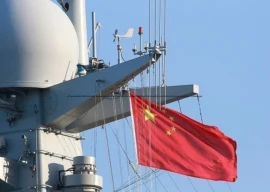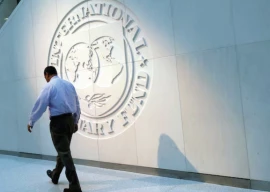
The International Monetary Fund (IMF) has placed a significant condition to abolish the Pakistan Sovereign Wealth Fund (PSWF) as a prerequisite for qualifying for a new bailout package, aiming to ensure transparency and accountability in the financial affairs of the country’s seven profitable state-owned firms. Through an Act of Parliament, the government had transferred the ownership and assets of these highly profitable enterprises to the PSWF, which has now become a major point of contention in finalising the staff-level agreement with the IMF, according to government sources.
The IMF has immediately sought a commitment to abolish the Fund and set a September 30th deadline to repeal the Pakistan Sovereign Wealth Fund Act 2023, which governs the operations of the PSWF. Highly placed sources revealed to The Express Tribune that a meeting between IMF Mission Chief Nathan Porter and finance ministry officials was held on Monday but remained inconclusive, with the IMF steadfast in its demand to abolish the Fund. Pakistani authorities have sought more time to provide a final response, but it appears the government may have no choice but to agree to the IMF’s demand to bring transparency and accountability in the affairs of the seven companies.
The finance ministry’s spokesman, Qumar Abbasi, did not respond to The Express Tribune’s requests for comments.
The previous government had enacted the Pakistan Sovereign Wealth Fund Act to transfer the shares of seven profitable entities and then sell them overseas to raise money. The law states that the assets and profits of the Oil and Gas Development Company Limited (OGDCL), Pakistan Petroleum Limited, Mari Petroleum, National Bank of Pakistan, Pakistan Development Fund, Government Holdings (Private) Limited, and Neelum-Jhelum Hydropower Company will be shifted to the sovereign wealth fund.
Four of these seven companies earned a net profit of Rs386 billion in the fiscal year 2022-23, according to the Ministry of Finance’s report, including Rs225 billion by OGDCL, Pakistan’s most profitable entity. The government wants to sell the shares of these companies to foreign nations without following the competitive bidding process defined under the Privatisation Ordinance. As of last year, these seven companies have a net worth of Rs2.3 trillion, which the government planned to use for raising funds through the sale of shares and using their earnings for capital investments.
However, the sources said, the IMF is of the view that Pakistan lacks the capital to invest in the Fund and that the government would also lose control over its strategic assets. The IMF urged the government to strengthen its privatisation law instead of selling these strategic assets in a non-transparent manner. The Pakistani authorities believe the existing privatisation mechanism is cumbersome and ineffective, but the IMF has not accepted this position, said the sources.
The sources said that the IMF has asked that if the government was keen to move ahead with its plan to get a new programme then it will have to repeal the law.
The finance ministry has been unable to finalise a deal with the IMF despite the heavy losses inflicted on the economy and the people through its 2024-25 budget. Finance Minister Muhammad Aurangzeb has not yet given a firm deadline to conclude the staff-level agreement.
Prime Minister Shehbaz Sharif recently approved a cut in the development budget by Rs50 billion and deferred a significant electricity rate increase from Rs3.95/unit to Rs7.12/unit (for 1 to 200 unit monthly consumers) for a period of three months. It remains unclear whether the IMF has approved this adjustment, although the prime minister stated that the IMF has been informed.
The PSWF is exempted from three core laws; the Privatisation Commission Ordinance, Public Procurement Regulatory Authority Ordinance, and the State-Owned Enterprises (SOE) Act, 2023. This exemption is a key concern for the IMF, which sees no justification for keeping the seven companies outside the ambit of the SOE Act of 2023 – which provides a comprehensive framework for the management of the SOEs, said the sources. Finance ministry officials believe that the government will still have some control over these companies through the boards even after selling stakes to Gulf nations, thus opposing the IMF’s demand.
The Abu Dhabi Investment Authority (ADIA) had provided technical assistance to Pakistan in drafting the PSWF law, with the federal government fully owning the fund and providing the initial capital through the transfer of shareholding of the SOEs. However, despite the enactment, the government has not yet made the fund operational. If the government transfers the profits and assets of these companies into the Fund, it will permanently lose a source of non-tax revenues.
The United Arab Emirates (UAE) had previously shown interest in acquiring stakes in Pakistan’s oil and gas sector companies, indicating a possibility for divesting shares of these assets. The money raised through the sale of these assets was planned to be used as Pakistan’s shares in joint ventures in agriculture, mining, and information technology sectors.



















COMMENTS (1)
Comments are moderated and generally will be posted if they are on-topic and not abusive.
For more information, please see our Comments FAQ